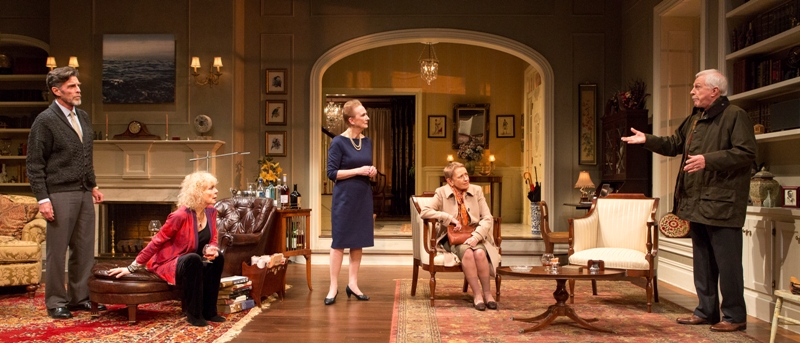
John Glover (Tobias) in Edward Albee’s A DELICATE BALANCE at McCarter Theatre Center. (Photo credit: Richard Termine)
Late in the third act of Edward Albee’s A DELICATE BALANCE, Agnes, the long-suffering wife, mother, and sister at the center of the play’s psychological examination of the distress wrought by tedium, says “Time. Time happens, I suppose. To people. Everything becomes… too late, finally.”
The same would seem to be true of plays.
Set entirely in the drawing room of an upper class suburban home with few markers of modernity, A DELICATE BALANCE exudes much of what we love about Albee’s work: deep psychological introspection, complex trauma, long speeches of capacious prose poetry, and the courage to dwell within the murkiness of everyday life without the need to impose pat solutions. It is no surprise it won the Pulitzer in 1967.
But the play’s stodgy 2013 revival presently at the McCarter leaves open questions of its contemporary relevance. Premiering just a few years after Albee’s landmark WHO’S AFRAID OF VIRGINIA WOOLF?, A DELICATE BALANCE offered strange, challenging, and therefore exciting themes and dramaturgy to the mid-century American stage, techniques that Albee’s followers and the playwright’s latter-day work have continued to explore and complicate. As currently staged at the McCarter, however, the play itself seems like a relic.
As the curtain rises, Agnes (Kathleen Chalfant) and Tobias (John Glover) are settling into their drawing room (set designer Daniel Ostling upholds the tradition of gorgeously meticulous McCarter sets) for after-dinner drinks and exposition of the play’s many tensions. Agnes worries that she will eventually go mad, precipitated in no small part by her dwindling patience with an alcoholic sister, Claire (Penny Fuller), and a thrice-divorced daughter, Julia (Francesca Faridany), soon to return home with her fourth marriage on the rocks. Tobias is dedicated to putting the best face on matters, to smoothing over the ruffles in the family’s suburban quietude without risking causing much of a disturbance himself: he’s happy to fix everybody a martini, but his instinct is always to ameliorate conflict, when not trying to escape into a book or newspaper.
The evening’s tension—dominated by Agnes’s growing aggravation with Claire who makes no apologies for or attempts to restrain her drinking, despite living under the charitable roof of her sister and brother-in-law—is broken when Edna (Roberta Maxwell) and Harry (James A. Stephens), close friends of Agnes and Tobias, show up unannounced, and soon declare their plans to stay indefinitely. While at home alone, Edna and Harry grew terrified for unknown and unprovoked reasons, and fled to the house of friends in search of comfort and respite.
Once Julia returns to find her room occupied by Edna and Harry, tension builds around questions of the right to space in the house, of friendship versus family, of duty to the people in one’s life, and of how a haunting fear of the past coupled with a crippling dread of the future looms over daily life.
The action of the play is of course ultimately in service of Albee’s familiar examination of the opaque fears and anxieties terrorizing the many frail psyches of his characters. Much of the playwright’s greatness lies in his understanding that we do not understand ourselves, and in his ability to locate characters at the nexus of introspection and bewilderment at a critical moment for action. A DELICATE BALANCE captures these traits fully.
But ultimately, this production offers little beyond a showpiece of Albee’s insight into the psychological foibles of humans. The three-hour production drags ploddingly, as each of the many long speeches are rolled out with methodic care, as if to stress unequivocally that all these characters have their own specific demons to bare. Kathleen Chalfant does well to access the brooding and scarred will of Agnes, but the character ultimately becomes just as heavy a drag on the play as she would on any social gathering: every speech seems to wallow, and there are many (Albee likes words as much as Pinter likes pauses). It is almost impressive that the much smaller role of Roberta Maxwell’s Edna manages to outdo Agnes for conjuring doldrums.
The two kinetic members of the cast are the drunken Claire (the people at AA are “alcoholics,” she insists, while she is simply “a drunk”), and Julia, frantically searching for the comforts of home. Neither manages to inject life into the play, as Claire’s wistfulness allows her to be secluded from the proceedings without much of a fight, and Julia becomes mostly an obstacle for her parents’ self-discovery.
The McCarter’s program designates the play’s time as “Now,” but Julia’s wardrobe and a curiously out-of-place laptop tucked into the corner of the set seem like awkward attempts at contemporizing a play that shows its age. A DELICATE BALANCE is an important and paradigm-challenging play, but this production flounders in its attempt to shake off the dust.
A DELICATE BALANCE
by Edward Albee
Directed by Emily Mann
January 18 – February 17, 2013
McCarter Theatre
91 University Place
Princeton, NJ, 08540
609-258-2787
http://www.mccarter.org/
http://www.mccarter.org/delicatebalance/


